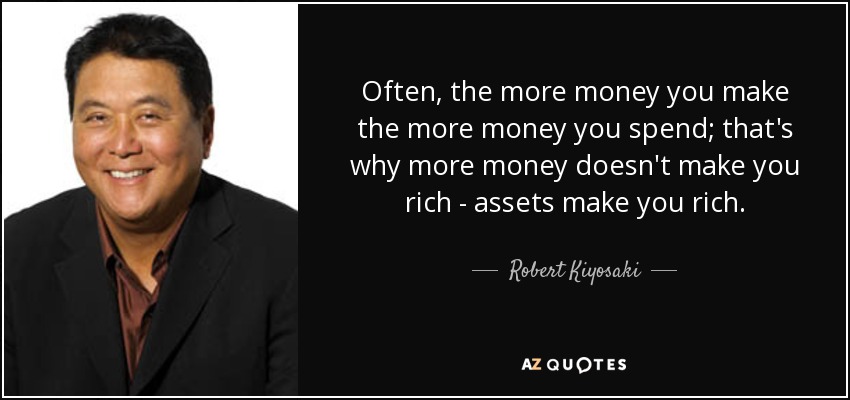QNS: Is $30,000 Salary a month enough?
When I ask this question to my clients, the first response I get is: HOW I FIND SUCH A JOB??
Last Sunday, Straits Times published an article titled $30,000 salaries, yet in serious debt (it is an premium article). This started almost an outrage in the Wealth Management and Personal Finance community in Singapore. Most of the comments were related to where to find such a job and probably missed the point of personal finance. Let’s explore the reasons when $30,000 salary a month is not enough?

Reason #1: You spend more than $30,000 a month
Typically, as we grow in affluence, our purchasing power increase and we tend to spend more to.
Meet John. John is a hardworking young professional. His first salary was $3000/month and he had to live a simple lifestyle. Along the years, John got promoted for his outstanding working performance and ability to show results. His salary gradually increase to $15,000/month. John is now working harder at work and often end work late. He will take a cab home (he used to take the public transport) and order a good meal from a nearby restaurant (he used to cook) to reward himself for the hard work. When he sees something that likes during shopping, he will buy it immediately (he used to ponder if the item is essential) because he feels that he can afford it and he don’t have much time to shop anyway. He buys his friends meals (he used to go dutch) because he feels he is doing well.
John wakes up one day and was shocked to find out that his bank account balance haven’t been increasing after his promotion and has decreased.
If you spend more than you earn, then you will be in deficit.

Reason #2: You acquire more debts that you can handle.
Previously, I wrote about a Quick Ratio that we can use to evaluate whether the company is financially healthy.
“A company CANNOT go bankrupt if it doesn’t have debts” ~Chengkok
I can’t remember who said this before so I’m just going to quote myself until someone prove me wrong. (Haha). During the COVID19 season, we are seeing record number of companies going bankrupt and closing down. Examples are like JC Penny, Hertz and AMC just to name a few. If you look at their financial records, it would be just a matter of them that they will go under.
Similarly, for personal finance, if you take on too much debts than you can handle, your cashflow will be severely impacted.
Reason #2.1: Leverage
Reason 2.1 is a compounder for reason 2.
When I was 19 years old, I was scared stiff of the stock market. That was because I had a friend who lost over USD$50,000 in one night in his CFD trade. $50,000 is a huge sum to a 19 year old kid and it scared me silly.
Leverage works like this. You ONLY require a SMALL sum to get a BIGGER exposure. Most people who have limited capital are attracted to this because of the high returns. However, if the stock price goes south, you have to pay for the exposure too. A capital of $10,000 can easily give you an exposure of $200,000. However, if the stock price plunge, you could lose a significant portion of the $200,000 that you DO NOT EVEN HAVE and hence acquire the debts that you don’t want.
“Go big or go home. Typically in investing, people go home” ~Chengkok

Reason #3: Bad Habits
In The Straits Times article, bad habits or poor financial planning will cause your financial downfall no matter how much you earn. Data from the Monetary Authority of Singapore shows that
- 34 home owners have asked to stop payment for their loan until December
- 2100 people have problem paying education and renovation loans
- 6200 have asked to convert high credit card debt into term loan on lower interest rates
The list goes on. Gambling is also one habit that might cause financial woes. We are often reminded by the National Council on Problem Gambling on not to gamble especially during the Chinese New Year.
Conclusion
Some questions that we can ask ourselves in our financial journey.
- How much are you spending? Is it necessary? Can we cut down?
- How much are you leveraging? Is it good / bad debt?
- How much are you paying yourself
Income plays just one part in your Wealth Management journey. It is your habits, your mindset and the people that you hang around with that helps you reach the level of financial freedom you want.
You can also find jobs overseas using a portal such as jobble. Overseas market might require the skillset that you have.
No one will care about your money as much as you do.
In Wealth Management, it is important to Pay yourself first. Beware of scams. Before you invest in any company or popular investment opportunity, be sure to do your own due diligence. If you wish to learn more about investment, I hope to nurture genuine relationships with all of my readers.
Check out my most popular blog post in 2020 so far: 5 mistakes people make using their CPF.
Please feel free to contact me on my Facebook Page or Telegram Channel! Or subscribe to our newsletter now!

[…] Financial Officer of a company. He was earning around $15,000 monthly (Our most popular article: Is $30,000 salary a month enough?) and I thought he probably had a good financial plan. It turns out that he have less than $1,000 in […]
[…] HRAsia in 2015, 14% (of Singaporeans) have no savings at all and the most surprising find was the 37% of the top-income bracket is essentially spending everything they […]